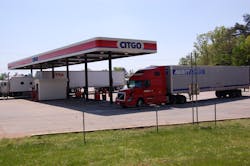U.S. diesel and gasoline prices keep declining
Fuel prices continued falling in the U.S. this week, according to data tracked by the Energy Information Administration (EIA), dropping the most in the Midwest and Rocky Mountains, though neither ended up home to the cheapest price for either diesel or gasoline in the country.
The national average retail pump price for diesel declined 11.6 cents this week to $3.419 per gallon, EIA noted; which is 45.2 cents per gallon cheaper compared to the same week in 2013.
Diesel prices dipped in every region of the country, decreasing the most in the Rocky Mountains by 15.1 cents to $3.504 per gallon, followed by the Midwest with a 15 cent dip to $3.473 per gallon, the agency said.
However, the Lower Atlantic turned out to be home for the cheapest diesel price in the U.S., EIA pointed out, reaching $3.314 per gallon after a 7.2 cent drop this week.
The national average retail pump price for gasoline declined 12.5 cents to $2.554 per gallon, the agency reported, which is 6.5 cents per gallon cheaper compared to the same week in 2013.
Gasoline prices dropped in all regions of the U.S. but fell the most in the Midwest, with a 16.9 cent drop to $2.417 per gallon, followed by the Rocky Mountains with a 15.4 cent dip to $2.586 per gallon.
Yet the Gulf Coast remained home to the cheapest gasoline in the country, with prices falling 11.2 cents to $2.328 per gallon.
EIA also stressed in new analysis that the rapid decline in gasoline prices experienced in the U.S. since June – average retail prices per gallon of regular motor gasoline are down 28% from the end June through early December – may not much effect automobile travel, and in turn, overall gasoline consumption in the country.
The agency said one reason is that automobile travel in the U.S. is much less “elastic,” meaning it takes a 25% to 50% decrease in the price of gasoline to raise automobile travel 1% because increased fuel economy balances out increases in vehicle miles traveled in response to lower prices and other factors.
By contrast, in the mid 1990s, the price elasticity for gasoline was much higher as it only took a 12% decrease in the price of gasoline to raise automobile travel by 1%, EIA said.
Other explanations postulated by the agency for the rapid decline in gasoline “price elasticity” in recent decades include:
- The slowing of per-capita vehicle miles traveled (VMT). After increasing for decades, VMT per capita slowed in the late 1990s and even declined in recent years.
- The retirement of the baby boomer generation, because retirees tend to drive less than the working-age population.
- Population migrations to urban area, as opposed to rural and suburban areas, because urban residents typically drive less.
- Declines in licensing rates for teenagers, as young people delay or avoid getting their drivers' permits and licenses.
- The reduced share of household income devoted to motor gasoline expenses. As gasoline represents a smaller share of household expenditures, drivers may be less sensitive to fluctuations in price.
About the Author
Sean Kilcarr
Editor in Chief
Sean Kilcarr is a former longtime FleetOwner senior editor who wrote for the publication from 2000 to 2018. He served as editor-in-chief from 2017 to 2018.
